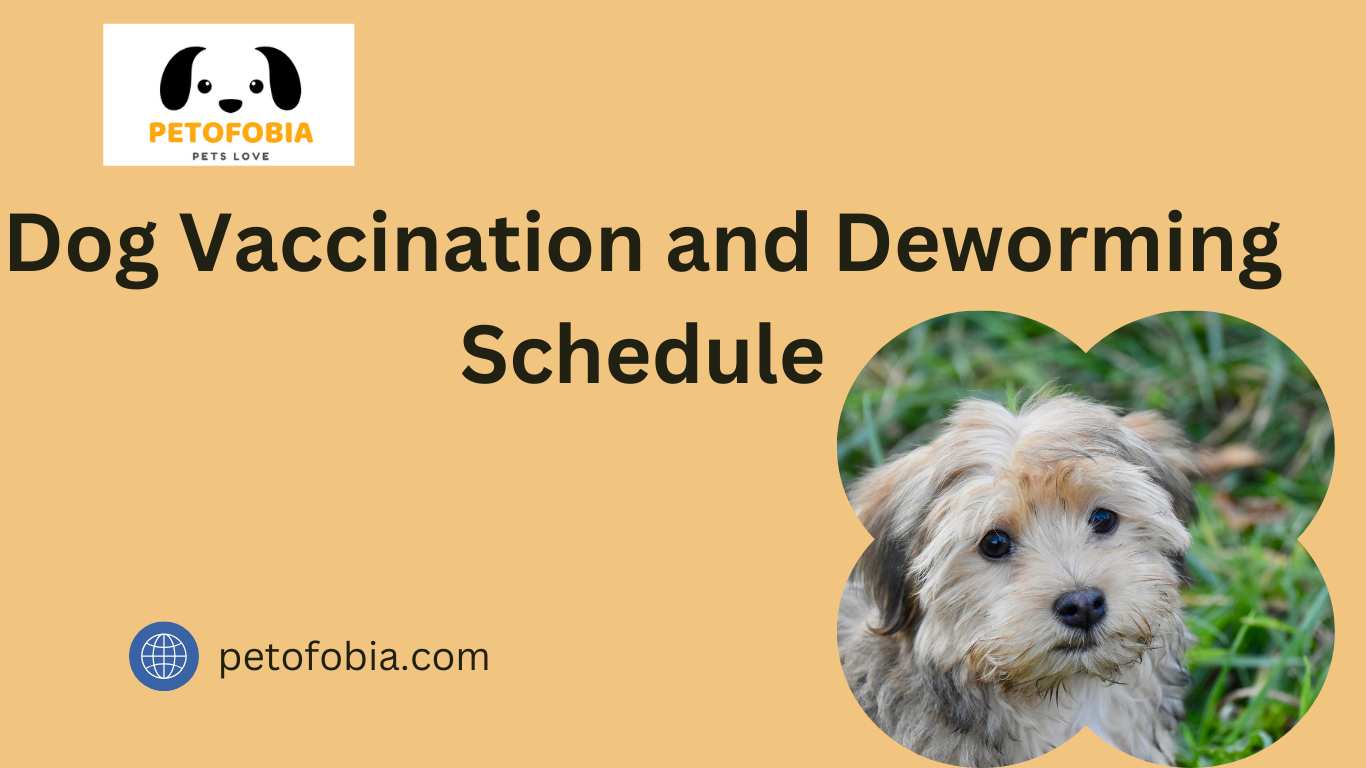Table of Contents
ToggleIntroduction
It is imperative that one keep the dog healthy at all times. The vaccines and deworming give them an immunity against the fatal diseases. Or better yet, have a proper schedule to make sure that they ought to be alright. In this guide, there are some important points that are discussed, which include the right time to go for vaccination and deworming. This will assist you in ensuring that your furry companion is always safe and will not fall ill. Let’s dive into the details.
Why Vaccination is Important
Vaccination prevents many dangerous diseases. It has the ability of enhancing the immune system of the body on the various kinds of viruses. Certain diseases are lethal for example rabies. Gardner further explains that vaccinating your dog benefits the dog and humans since the diseases which affect these animals also affect humans.
Immunization in selective cases or randomly also helps avoiding the occurrences of the epidemic. It also helps to reduce the amount of money spent in vet bills. So it is true that a well-vaccinated dog enjoys a healthy life span than the one that is not immunized.
Yet, one should make sure to follow the vet recommendations. That is why it is recommended to stick to the schedule in order to provide complete protection against threats. Puppies require vaccination not later than one year age. It prevents students from being easily affected by illnesses from the first days of the class.
Core Vaccines for Dogs
There are certain types of vaccines that should be administered to all dogs barring none. They protect against life-threatening diseases. These include:
- Canine Distemper: A highly contagious viral disease.
- Parvovirus: Causes severe vomiting and diarrhea.
- Adenovirus (Hepatitis): Affects the liver and respiratory system.
Rabies: Fatal and transmissible to humans
Using such vaccines is becoming mandatory for the dogs. They provide lifelong protection. These vets suggest that these be given to every pet. These are some of the vaccines that should not be missed. They should be available according to the plan that has been formulated for them.
Non-Core Vaccines
These are vaccines that are not compulsory to be taken by most individuals, but they are useful regardless. HIV prevalence greatly depends on the lifestyle and the risk of exposure to the virus. These include:
- Kennel Cough: Bordetella bronchiseptica is one that affects dogs that socialize with other dogs.
- Leptospirosis: Protects against bacterial infections.
- Lyme Disease: Essential for dogs in tick-prone areas.
- Canine Influenza: Prevents respiratory infections.
It is always important to consult your vet in matters that concern your pet and here you should discuss him/her concerning these vaccines. In this case some dogs require them depending on their activities. There are also calls for augmented mobility for dogs when traveling since they may need some additional protection. The following vaccines should be administered if the dog falls into any of the categories camped above.
Puppy Vaccination Schedule
Puppies need vaccinations early. Their immune body is also not that strong since they have not yet attained the appropriate age for the same. Follow this schedule:
- 6-8 weeks: First shots (Distemper, Parvovirus, Adenovirus).
- 10-12 weeks: Second dose + Leptospirosis, Bordetella (if needed).
- 14-16 weeks: Final core vaccine booster + Rabies.
- 12-16 months: Annual booster shots.
A dog’s vaccination is not complete in a single shot. There is no specific time that one can say is appropriate for castration in dogs that is appropriate to everyone but a vet can recommend the right time. Check with your veterinarians for vaccines that your puppy should get on time to avoid effects of serious ailment.
Adult Dog Vaccination Schedule
It is also important to know that adult dogs must be taken for booster shots. This keeps their immunity strong. Follow this routine:
- Every Year: Bordetella, Leptospirosis, Lyme disease (if required).
- Every 1-3 Years: Core vaccine boosters (Distemper, Parvovirus, Adenovirus, Rabies).
- As Needed: Canine Influenza for high-risk dogs.
With regard to the booster, the frequency is a subject that a vet will need to explain to you. Some of the vaccines are long-lasting than the others. This way, one is monitored as to when he/she is due for the required shots. Don’t skip yearly vet visits.
Importance of Deworming
Deworming protects against internal parasites. Thus, worms can cause significant health problems. Puppies are most vulnerable. Common worms include:
- Roundworms: Affect digestion and growth.
- Hookworms: Cause anemia and weakness.
- Tapeworms: These are a parasite which causes weight loss and may lead to irritation.
- Whipworms: Cause diarrhea and dehydration.
Deworming prevents these harmful infections. It can also help in digestion of food and general body energy. There are many benefits when it comes to feeding your dog natural food such as it will be healthier and more active. Deworming is also a way of preventing humans from being a potential host to the worms as well.
Puppy Deworming Schedule
Puppies need frequent deworming. Their immune system is weak. Follow this schedule:
- 2 weeks: First deworming.
- 4, 6, 8 weeks: Follow-up doses.
- Monthly till the sixth month: Regular deworming.
- After 6 months: Switch to an adult schedule.
Worms spread through contaminated environments. Early deworming stops infestation. Alternatively, a vet is going to suggest on the most appropriate deworming schedule.
Adult Dog Deworming Schedule
Adult dogs also need deworming. The frequency of these activities can be determined from; Lifestyle and Risk factor. General guidelines include:
- For most dogs, they require a monthly deworming regime but if one is unable to do it as frequently then once every three months is advisable.
- Every month: For dogs at high risk.
- As needed to bring up a vomit, for diarrhea, and if they have sustained a weight loss.
It can also be used in the paragraph: ‘ Regular vet checkups help the veterinarian discover worms at an early stage. Stool tests can confirm infections. Regular regular deworming keeps the following severe health complications away;
Signs of Worm Infestation
Dogs with worms show symptoms. Watch out for:
- Weight loss
- Bloated stomach
- Vomiting or diarrhea
- Lethargy
- Scooting or itching
In case of the expression of any of these signs, it is crucial to seek help from a veterinarian. Early treatment prevents complications. These drugs are safe and efficient in the case of treatment against helminths diseases.
How to Give Deworming Medication
The deworming medication is available in various types. Options include:
- Tablets: This dosage form can easily be administered with the food or spice of the patient’s preference to ensure that it gets to the targeted area.
- Liquids: Can accustom to meals They can be diluted in liquids They can be infused with liquids Food items: Can be mixed with liquids.
- Chewables: Tasty and convenient.
- Injections: Given by vets for severe cases.
Select a method appropriate to the abovementioned conditions for your dog. Follow the correct dosage. Overdosing can cause side effects. In case of administering any medication, always seek the advice of a veterinarian first as a precaution.
Maintaining a Healthy Routine
Good hygiene prevents infections. Keep your dog’s environment clean. Steps to maintain health:
- Clean food and water bowls daily.
- Dispose of waste properly.
- Use flea and tick prevention.
- Regular vet checkups.
- Provide a balanced diet.
- A healthy lifestyle boosts immunity. They crucially depend on care as the next point at partly indicates. It is always to prevent a particular disease rather than treating the disease once it has completed its early stage.
Conclusion
Others include dog vaccination as well as deworming sessions for the animals. They shield against diseases and parasites that are fatal to human beings. Having this schedule will help people lead a healthy life so that they can be alive throughout their respective life spans. In other cases, it would be most advisable to consult the vet with regards to the best course of action.





